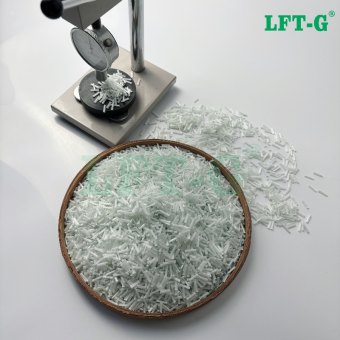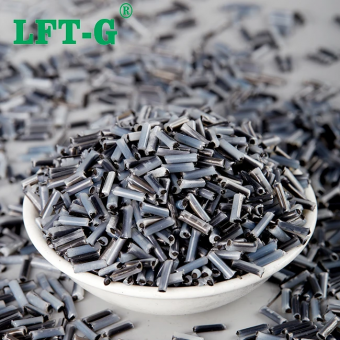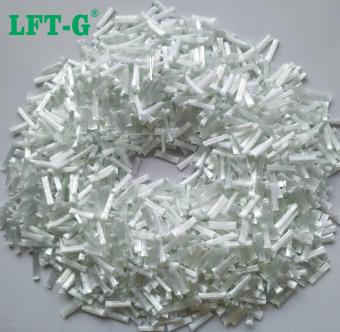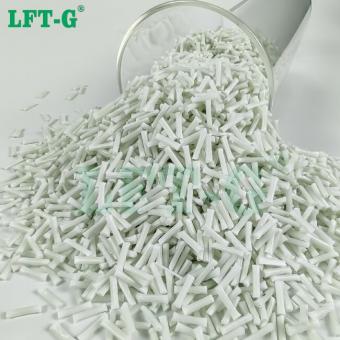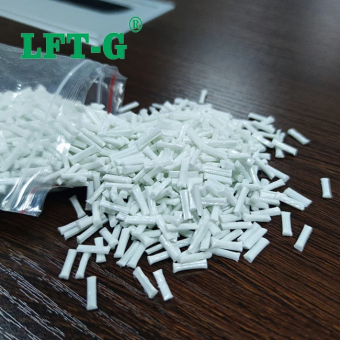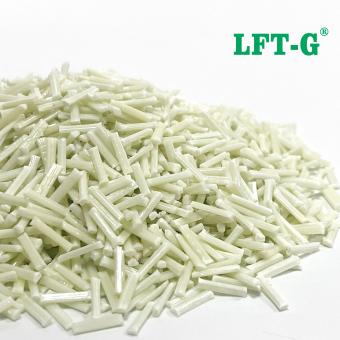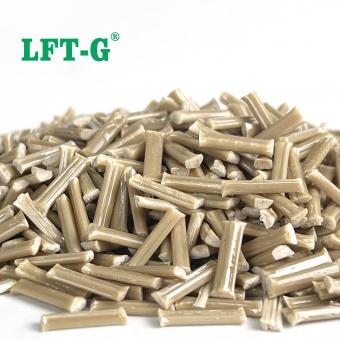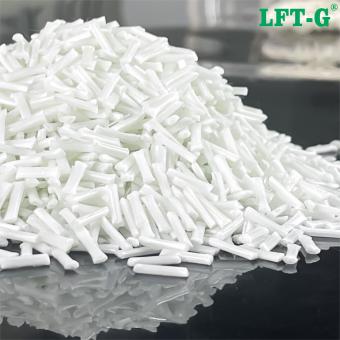-
LFT-G brand PA6 Polyamide6 nylon6 filling long glass fiber40 orginal color for automotive partsWhat is PA6 plastic? polyamide (PA), usually called Nylon, is a hetero-chain polymer containing amide group (-NHCo -) in the main chain. It can be divided into aliphatic group and aromatic group. It is the earliest developed and the most used thermoplastic engineering material. Polyamide main chain contains many repeated amide group, used as a plastic called nylon, used as a synthetic fiber called nylon. A variety of different polyamides can be prepared according to the number of carbon atoms contained in binary amines and dibasic acids or amino acids. At present, there are dozens of polyamides, among which polyamide-6, polyamide-66 and polyamide-610 are the most widely used. Polyamide-6 is an aliphatic polyamide, with light weight, strong strength, wear resistance, weak acid and alkali resistance and some organic solvents, easy molding and processing and other excellent properties, widely used in fiber, engineering plastics and thin films and other fields, but PA6 molecular chain segment contains strong polarity amide groups, easy to form hydrogen bonds with water molecules, The product has the disadvantages of large water absorption, poor dimensional stability, low impact strength in dry state and low temperature, strong acid and alkali resistance. Advantages of nylon 6: High mechanical strength, good toughness, high tensile and compressive strength. Outstanding fatigue resistance, the parts after repeated bending can still maintain the original mechanical strength. High softening point, heat resistant. Smooth surface, small friction coefficient, wear-resistant. Corrosion resistance, very resistant to alkali and most salts, also resistant to weak acids, oil, gasoline, aromatic compounds and general solvents, aromatic compounds are inert, but not resistant to strong acids and oxidants. It can resist the corrosion of gasoline, oil, fat, alcohol, alkaline and so on, and has good anti-aging ability. It is self-extinguishing, non-toxic, odorless, good weather resistance, inert to biological erosion, and has good antibacterial and mildew resistance. Has excellent electrical performance, good electrical insulation, nylon volume resistance is high, high breakdown voltage resistance, in dry environment, can work frequency insulation material, even in high humidity environment still has good electrical insulation. Light weight, easy dyeing, easy forming, because of low melting viscosity, can flow quickly. Disadvantages of Nylon 6: Easy to absorb water, water absorption, saturated water can reach more than 3%. Poor light resistance, in the long-term high temperature environment will oxidize with oxygen in the air, the color turns brown at the beginning, and the subsequent surface is broken and cracked. Injection molding technology requirements more strict, the existence of trace moisture will cause great damage to the quality of molding; The dimensional stability of the product is difficult to control because of thermal expansion. The existence of sharp Angle in the product will lead to stress concentration and reduce the mechanical strength; If the wall thickness is not uniform, it will lead to the distortion and deformation of the parts. High precision of equipment is required in post-processing. Will absorb water, alcohol and swelling, not resistant to strong acid and oxidant, can not be used as acid-resistant materials. Why filling Long Glass Fiber? PA6 has excellent properties such as light weight, strong strength, abrasion resistance, weak acid and alkali resistance and some organic solvents, and easy molding and processing. It is widely used in the fields of fibers, engineering plastics and films. However, the molecular chain segment of PA6 contains highly polar amide groups, which are easy to form hydrogen bonds with water molecules. The product has the disadvantages of large water absorption, poor dimensional stability, low impact strength in dry state and low temperature, strong acid and alkali resistance. With the development of science and technology and the improvement of life quality, the defects in some properties of traditional PA6 materials have limited its development in some fields. In order to improve the performance of PA6 and expand its application field, PA6 should be modified. Filling enhancement modification is a common method for physical modification of PA6. It refers to the modification of PA6 by adding fillers such as glass fiber and carbon fiber into the matrix to significantly improve the mechanical properties, flame retardant properties, thermal conductivity and dimensional stability of the material. What is application of PA6-LGF? Modified section of 30% long glass fiber reinforced PA6 is the ideal material for processing power tool shell, power tool parts, engineering machinery parts and automobile parts. Its mechanical properties, dimensional stability, heat resistance and aging resistance have been significantly improved. The fatigue resistance strength is 2.5 times that of unenha...
- Polyamide 6 composite
- lgf thermoplastic resin
- High impact PA6
- injection molding plastic
- pa6 filling long glass fiber
- Reinforced plastic
Tags :
-
PA6 Nylon6 Polyamide6 composite Long Glass Fiber modified plastic 12mm in length original colorPA6 material PA6 is one of the most widely used materials in the current field, and PA6 is a very good engineering plastic with balanced and good performance. The raw materials for the manufacture of nylon 6 engineering plastic are extensive and inexpensive, and it is not restricted by the technological monopoly of foreign companies. However, in order to make good use of this inexpensive and excellent material, we must first understand it. Today, we will start with glass fiber reinforced PA6 engineering plastics, because it is the most important category of PA6 engineering plastics. Just like any other engineering plastics, PA6 has advantages and disadvantages, such as high water absorption, low temperature impact toughness and dimensional stability is relatively poor. So engineers will use different methods to make PA6 better, which we call modification. At present, the most common method is to blend and modify PA6 with glass fiber (GF). Today, we will take a look at the mechanical properties of PA6 engineering plastics under the glass fiber GF system for reference and help us select materials. PA6-LGF 1. Influence of glass fiber content on PA6 engineering plastics We can find from the application and experiment that the content index is often one of the biggest influencing factors in fiber reinforced composites. As the glass fiber content increases, the number of glass fibers per unit area of the material will increase, which means that the PA6 matrix between the glass fibers will become thinner. This change determines the impact toughness, tensile strength, bending strength and other mechanical properties of glass fiber reinforced PA6 composites. In terms of impact performance, the increase of glass fiber content will greatly increase the notch impact strength of PA6. Taking long glass fiber (LGF) filling PA6 as an example, when the filling volume increases to 35%, the notch impact strength will increase from 24.8J/m to 128.5J/m. But the glass fiber content is not more is better, short glass fiber (SGF) filling volume reached 42%, the impact strength of the material reached the highest 17.4kJ/㎡, but continue to add will let the gap impact strength showed a downward trend. In terms of bending strength, the increase of the amount of glass fiber will make the bending stress can be transferred between the glass fiber through the resin layer; At the same time, when the glass fiber is extracted from the resin or broken, it will absorb a lot of energy, thus improving the bending strength of the material. The above theory is verified by experiments. The data show that the bending elastic modulus increases to 4.99GPa when the LGF (long glass fiber) is filled to 35%. When the content of SGF (short glass fiber) is 42%, the bending elastic modulus reaches 10410MPa, which is about 5 times that of pure PA6. 2. Influence of glass fiber retention length on PA6 composites The fiber length of the glass fiber also has an obvious effect on the mechanical properties of the material. When the length of the glass fiber is less than the critical length (the length of the fiber when the material has the tensile strength of the fiber), the interface binding area of the glass fiber and the resin increases with the increase of the length of the glass fiber. When the composite material is broken, the resistance of the glass fiber from the resin is also greater, so as to improve the ability to withstand the tensile load. When the length of glass fiber exceeds the critical, the longer glass fiber can absorb more impact energy under impact load. In addition, the end of the glass fiber is the initiation point of crack growth, and the number of long glass fiber ends is relatively less, and the impact strength can be significantly improved. The experimental results show that the tensile strength of the material increases from 154.8MPa to 164.4MPa when the glass fiber content is kept at 40% and the length of the glass fiber increases from 4mm to 13mm. The bending strength and notched impact strength increased by 24% and 28%, respectively. Moreover, the research shows that when the original length of the glass fiber is less than 7mm, the material performance increases more obviously. Compared with short glass fiber, long glass fiber reinforced PA6 material has better appearance warping resistance, and can better maintain mechanical properties under high temperature and humidity conditions. TDS for your reference PA6 can be made into long glass fiber reinforced material by adding 20%-60% long glass fiber according to the characteristics of the product. PA6 with long glass fiber added has better strength, heat resistance, impact resistance, dimensional stability and warping resistance than without glass fiber added. Following TDS show the data of PA6-LGF30. Application PA6-LGF has the largest proportion of applications in the automotive industry, by electronic and electrical applications, and also involving machinery and engineering ...
- PA6 thermoplastic resin materials
- nylon 6 granules
- glass fiber reinforced plastics granules
- long fiber compounds pa6
- Injection molding plastic
- LFT-G reinforced material
Tags :
-
LFT-G brand Polyamide6 nylon6 filling long glass fiber40 orginal color for automotive partsWhat is PA6 plastic? polyamide (PA), usually called Nylon, is a hetero-chain polymer containing amide group (-NHCo -) in the main chain. It can be divided into aliphatic group and aromatic group. It is the earliest developed and the most used thermoplastic engineering material. Polyamide main chain contains many repeated amide group, used as a plastic called nylon, used as a synthetic fiber called nylon. A variety of different polyamides can be prepared according to the number of carbon atoms contained in binary amines and dibasic acids or amino acids. At present, there are dozens of polyamides, among which polyamide-6, polyamide-66 and polyamide-610 are the most widely used. Polyamide-6 is an aliphatic polyamide, with light weight, strong strength, wear resistance, weak acid and alkali resistance and some organic solvents, easy molding and processing and other excellent properties, widely used in fiber, engineering plastics and thin films and other fields, but PA6 molecular chain segment contains strong polarity amide groups, easy to form hydrogen bonds with water molecules, The product has the disadvantages of large water absorption, poor dimensional stability, low impact strength in dry state and low temperature, strong acid and alkali resistance. Advantages of nylon 6: High mechanical strength, good toughness, high tensile and compressive strength. Outstanding fatigue resistance, the parts after repeated bending can still maintain the original mechanical strength. High softening point, heat resistant. Smooth surface, small friction coefficient, wear-resistant. Corrosion resistance, very resistant to alkali and most salts, also resistant to weak acids, oil, gasoline, aromatic compounds and general solvents, aromatic compounds are inert, but not resistant to strong acids and oxidants. It can resist the corrosion of gasoline, oil, fat, alcohol, alkaline and so on, and has good anti-aging ability. It is self-extinguishing, non-toxic, odorless, good weather resistance, inert to biological erosion, and has good antibacterial and mildew resistance. Has excellent electrical performance, good electrical insulation, nylon volume resistance is high, high breakdown voltage resistance, in dry environment, can work frequency insulation material, even in high humidity environment still has good electrical insulation. Light weight, easy dyeing, easy forming, because of low melting viscosity, can flow quickly. Disadvantages of Nylon 6: Easy to absorb water, water absorption, saturated water can reach more than 3%. Poor light resistance, in the long-term high temperature environment will oxidize with oxygen in the air, the color turns brown at the beginning, and the subsequent surface is broken and cracked. Injection molding technology requirements more strict, the existence of trace moisture will cause great damage to the quality of molding; The dimensional stability of the product is difficult to control because of thermal expansion. The existence of sharp Angle in the product will lead to stress concentration and reduce the mechanical strength; If the wall thickness is not uniform, it will lead to the distortion and deformation of the parts. High precision of equipment is required in post-processing. Will absorb water, alcohol and swelling, not resistant to strong acid and oxidant, can not be used as acid-resistant materials. Why filling Long Glass Fiber? PA6 has excellent properties such as light weight, strong strength, abrasion resistance, weak acid and alkali resistance and some organic solvents, and easy molding and processing. It is widely used in the fields of fibers, engineering plastics and films. However, the molecular chain segment of PA6 contains highly polar amide groups, which are easy to form hydrogen bonds with water molecules. The product has the disadvantages of large water absorption, poor dimensional stability, low impact strength in dry state and low temperature, strong acid and alkali resistance. With the development of science and technology and the improvement of life quality, the defects in some properties of traditional PA6 materials have limited its development in some fields. In order to improve the performance of PA6 and expand its application field, PA6 should be modified. Filling enhancement modification is a common method for physical modification of PA6. It refers to the modification of PA6 by adding fillers such as glass fiber and carbon fiber into the matrix to significantly improve the mechanical properties, flame retardant properties, thermal conductivity and dimensional stability of the material. What is application of PA6-LGF? Modified section of 30% long glass fiber reinforced PA6 is the ideal material for processing power tool shell, power tool parts, engineering machinery parts and automobile parts. Its mechanical properties, dimensional stability, heat resistance and aging resistance have been significantly improved. The fatigue resistance strength is 2.5 times that of unenha...
- Polyamide 6 composite properties
- lgf thermoplastic resin good price
- High impact PA6 instead metal plastic
- injection molding plastic gf30 filter
- pa6 filling long glass fiber customized
- Reinforced plastic lightweight compounds
Tags :
-
Xiamen LFT-G Nylon 6 Polyamide 6 composite Long Glass Fiber modified plastic 12mm original colorPA6 material PA6 is one of the most widely used materials in the current field, and PA6 is a very good engineering plastic with balanced and good performance. The raw materials for the manufacture of nylon 6 engineering plastic are extensive and inexpensive, and it is not restricted by the technological monopoly of foreign companies. However, in order to make good use of this inexpensive and excellent material, we must first understand it. Today, we will start with glass fiber reinforced PA6 engineering plastics, because it is the most important category of PA6 engineering plastics. Just like any other engineering plastics, PA6 has advantages and disadvantages, such as high water absorption, low temperature impact toughness and dimensional stability is relatively poor. So engineers will use different methods to make PA6 better, which we call modification. At present, the most common method is to blend and modify PA6 with glass fiber (GF). Today, we will take a look at the mechanical properties of PA6 engineering plastics under the glass fiber GF system for reference and help us select materials. PA6-LGF 1. Influence of glass fiber content on PA6 engineering plastics We can find from the application and experiment that the content index is often one of the biggest influencing factors in fiber reinforced composites. As the glass fiber content increases, the number of glass fibers per unit area of the material will increase, which means that the PA6 matrix between the glass fibers will become thinner. This change determines the impact toughness, tensile strength, bending strength and other mechanical properties of glass fiber reinforced PA6 composites. In terms of impact performance, the increase of glass fiber content will greatly increase the notch impact strength of PA6. Taking long glass fiber (LGF) filling PA6 as an example, when the filling volume increases to 35%, the notch impact strength will increase from 24.8J/m to 128.5J/m. But the glass fiber content is not more is better, short glass fiber (SGF) filling volume reached 42%, the impact strength of the material reached the highest 17.4kJ/㎡, but continue to add will let the gap impact strength showed a downward trend. In terms of bending strength, the increase of the amount of glass fiber will make the bending stress can be transferred between the glass fiber through the resin layer; At the same time, when the glass fiber is extracted from the resin or broken, it will absorb a lot of energy, thus improving the bending strength of the material. The above theory is verified by experiments. The data show that the bending elastic modulus increases to 4.99GPa when the LGF (long glass fiber) is filled to 35%. When the content of SGF (short glass fiber) is 42%, the bending elastic modulus reaches 10410MPa, which is about 5 times that of pure PA6. 2. Influence of glass fiber retention length on PA6 composites The fiber length of the glass fiber also has an obvious effect on the mechanical properties of the material. When the length of the glass fiber is less than the critical length (the length of the fiber when the material has the tensile strength of the fiber), the interface binding area of the glass fiber and the resin increases with the increase of the length of the glass fiber. When the composite material is broken, the resistance of the glass fiber from the resin is also greater, so as to improve the ability to withstand the tensile load. When the length of glass fiber exceeds the critical, the longer glass fiber can absorb more impact energy under impact load. In addition, the end of the glass fiber is the initiation point of crack growth, and the number of long glass fiber ends is relatively less, and the impact strength can be significantly improved. The experimental results show that the tensile strength of the material increases from 154.8MPa to 164.4MPa when the glass fiber content is kept at 40% and the length of the glass fiber increases from 4mm to 13mm. The bending strength and notched impact strength increased by 24% and 28%, respectively. Moreover, the research shows that when the original length of the glass fiber is less than 7mm, the material performance increases more obviously. Compared with short glass fiber, long glass fiber reinforced PA6 material has better appearance warping resistance, and can better maintain mechanical properties under high temperature and humidity conditions. TDS for your reference PA6 can be made into long glass fiber reinforced material by adding 20%-60% long glass fiber according to the characteristics of the product. PA6 with long glass fiber added has better strength, heat resistance, impact resistance, dimensional stability and warping resistance than without glass fiber added. Following TDS show the data of PA6-LGF30. Application PA6-LGF has the largest proportion of applications in the automotive industry, by electronic and electrical applications, and also involving machinery and engineering ...view more
-
LFT POLYAMIDE 6 Nylon Reinforced long glass fiber orginal color for automotive partsWhat is PA6 plastic? polyamide (PA), usually called Nylon, is a hetero-chain polymer containing amide group (-NHCo -) in the main chain. It can be divided into aliphatic group and aromatic group. It is the earliest developed and the most used thermoplastic engineering material. Polyamide main chain contains many repeated amide group, used as a plastic called nylon, used as a synthetic fiber called nylon. A variety of different polyamides can be prepared according to the number of carbon atoms contained in binary amines and dibasic acids or amino acids. At present, there are dozens of polyamides, among which polyamide-6, polyamide-66 and polyamide-610 are the most widely used. Polyamide-6 is an aliphatic polyamide, with light weight, strong strength, wear resistance, weak acid and alkali resistance and some organic solvents, easy molding and processing and other excellent properties, widely used in fiber, engineering plastics and thin films and other fields, but PA6 molecular chain segment contains strong polarity amide groups, easy to form hydrogen bonds with water molecules, The product has the disadvantages of large water absorption, poor dimensional stability, low impact strength in dry state and low temperature, strong acid and alkali resistance. Advantages of nylon 6: High mechanical strength, good toughness, high tensile and compressive strength. Outstanding fatigue resistance, the parts after repeated bending can still maintain the original mechanical strength. High softening point, heat resistant. Smooth surface, small friction coefficient, wear-resistant. Corrosion resistance, very resistant to alkali and most salts, also resistant to weak acids, oil, gasoline, aromatic compounds and general solvents, aromatic compounds are inert, but not resistant to strong acids and oxidants. It can resist the corrosion of gasoline, oil, fat, alcohol, alkaline and so on, and has good anti-aging ability. It is self-extinguishing, non-toxic, odorless, good weather resistance, inert to biological erosion, and has good antibacterial and mildew resistance. Has excellent electrical performance, good electrical insulation, nylon volume resistance is high, high breakdown voltage resistance, in dry environment, can work frequency insulation material, even in high humidity environment still has good electrical insulation. Light weight, easy dyeing, easy forming, because of low melting viscosity, can flow quickly. Disadvantages of Nylon 6: Easy to absorb water, water absorption, saturated water can reach more than 3%. Poor light resistance, in the long-term high temperature environment will oxidize with oxygen in the air, the color turns brown at the beginning, and the subsequent surface is broken and cracked. Injection molding technology requirements more strict, the existence of trace moisture will cause great damage to the quality of molding; The dimensional stability of the product is difficult to control because of thermal expansion. The existence of sharp Angle in the product will lead to stress concentration and reduce the mechanical strength; If the wall thickness is not uniform, it will lead to the distortion and deformation of the parts. High precision of equipment is required in post-processing. Will absorb water, alcohol and swelling, not resistant to strong acid and oxidant, can not be used as acid-resistant materials. Why filling Long Glass Fiber? PA6 has excellent properties such as light weight, strong strength, abrasion resistance, weak acid and alkali resistance and some organic solvents, and easy molding and processing. It is widely used in the fields of fibers, engineering plastics and films. However, the molecular chain segment of PA6 contains highly polar amide groups, which are easy to form hydrogen bonds with water molecules. The product has the disadvantages of large water absorption, poor dimensional stability, low impact strength in dry state and low temperature, strong acid and alkali resistance. With the development of science and technology and the improvement of life quality, the defects in some properties of traditional PA6 materials have limited its development in some fields. In order to improve the performance of PA6 and expand its application field, PA6 should be modified. Filling enhancement modification is a common method for physical modification of PA6. It refers to the modification of PA6 by adding fillers such as glass fiber and carbon fiber into the matrix to significantly improve the mechanical properties, flame retardant properties, thermal conductivity and dimensional stability of the material. What is application of PA6-LGF? Modified section of 30% long glass fiber reinforced PA6 is the ideal material for processing power tool shell, power tool parts, engineering machinery parts and automobile parts. Its mechanical properties, dimensional stability, heat resistance and aging resistance have been significantly improved. The fatigue resistance strength is 2.5 times that of unenha...
- Polyamide 6 composite materials
- lgf thermoplastic resin granules
- High impact pa series engineer plastic
- made in China high performance plastic
Tags :
-
LFT-G Polyamide6 nylon6 filling long glass fiber orginal color for automotive partsWhat is PA6 plastic? polyamide (PA), usually called Nylon, is a hetero-chain polymer containing amide group (-NHCo -) in the main chain. It can be divided into aliphatic group and aromatic group. It is the earliest developed and the most used thermoplastic engineering material. Polyamide main chain contains many repeated amide group, used as a plastic called nylon, used as a synthetic fiber called nylon. A variety of different polyamides can be prepared according to the number of carbon atoms contained in binary amines and dibasic acids or amino acids. At present, there are dozens of polyamides, among which polyamide-6, polyamide-66 and polyamide-610 are the most widely used. Polyamide-6 is an aliphatic polyamide, with light weight, strong strength, wear resistance, weak acid and alkali resistance and some organic solvents, easy molding and processing and other excellent properties, widely used in fiber, engineering plastics and thin films and other fields, but PA6 molecular chain segment contains strong polarity amide groups, easy to form hydrogen bonds with water molecules, The product has the disadvantages of large water absorption, poor dimensional stability, low impact strength in dry state and low temperature, strong acid and alkali resistance. Advantages of nylon 6: High mechanical strength, good toughness, high tensile and compressive strength. Outstanding fatigue resistance, the parts after repeated bending can still maintain the original mechanical strength. High softening point, heat resistant. Smooth surface, small friction coefficient, wear-resistant. Corrosion resistance, very resistant to alkali and most salts, also resistant to weak acids, oil, gasoline, aromatic compounds and general solvents, aromatic compounds are inert, but not resistant to strong acids and oxidants. It can resist the corrosion of gasoline, oil, fat, alcohol, alkaline and so on, and has good anti-aging ability. It is self-extinguishing, non-toxic, odorless, good weather resistance, inert to biological erosion, and has good antibacterial and mildew resistance. Has excellent electrical performance, good electrical insulation, nylon volume resistance is high, high breakdown voltage resistance, in dry environment, can work frequency insulation material, even in high humidity environment still has good electrical insulation. Light weight, easy dyeing, easy forming, because of low melting viscosity, can flow quickly. Disadvantages of Nylon 6: Easy to absorb water, water absorption, saturated water can reach more than 3%. Poor light resistance, in the long-term high temperature environment will oxidize with oxygen in the air, the color turns brown at the beginning, and the subsequent surface is broken and cracked. Injection molding technology requirements more strict, the existence of trace moisture will cause great damage to the quality of molding; The dimensional stability of the product is difficult to control because of thermal expansion. The existence of sharp Angle in the product will lead to stress concentration and reduce the mechanical strength; If the wall thickness is not uniform, it will lead to the distortion and deformation of the parts. High precision of equipment is required in post-processing. Will absorb water, alcohol and swelling, not resistant to strong acid and oxidant, can not be used as acid-resistant materials. Why filling Long Glass Fiber? PA6 has excellent properties such as light weight, strong strength, abrasion resistance, weak acid and alkali resistance and some organic solvents, and easy molding and processing. It is widely used in the fields of fibers, engineering plastics and films. However, the molecular chain segment of PA6 contains highly polar amide groups, which are easy to form hydrogen bonds with water molecules. The product has the disadvantages of large water absorption, poor dimensional stability, low impact strength in dry state and low temperature, strong acid and alkali resistance. With the development of science and technology and the improvement of life quality, the defects in some properties of traditional PA6 materials have limited its development in some fields. In order to improve the performance of PA6 and expand its application field, PA6 should be modified. Filling enhancement modification is a common method for physical modification of PA6. It refers to the modification of PA6 by adding fillers such as glass fiber and carbon fiber into the matrix to significantly improve the mechanical properties, flame retardant properties, thermal conductivity and dimensional stability of the material. What is application of PA6-LGF? Modified section of 30% long glass fiber reinforced PA6 is the ideal material for processing power tool shell, power tool parts, engineering machinery parts and automobile parts. Its mechanical properties, dimensional stability, heat resistance and aging resistance have been significantly improved. The fatigue resistance strength is 2.5 times that of unenha...view more
-
Xiamen LFT Polypropylene PP Copolymer with Long Carbon Fiber Reinforcement PolymersLong fiber reinforced thermoplastics are an excellent option to consider for metal replacement at a fraction of the weight.
- Plastic increased mechanical properties
- Customization materials high quality ISO
- Injection molding plastic engineering factory
- LCF Carbon fiber filled thermoplastic resin
- long length pellets compounds manufacturer
- Continuous fibre long cut good performance
Tags :
-
Xiamen LFT-G Nylon 6 Polyamide 6 composite Long Glass Fiber modified plastic 12mm original colorPA6 material PA6 is one of the most widely used materials in the current field, and PA6 is a very good engineering plastic with balanced and good performance. The raw materials for the manufacture of nylon 6 engineering plastic are extensive and inexpensive, and it is not restricted by the technological monopoly of foreign companies. However, in order to make good use of this inexpensive and excellent material, we must first understand it. Today, we will start with glass fiber reinforced PA6 engineering plastics, because it is the most important category of PA6 engineering plastics. Just like any other engineering plastics, PA6 has advantages and disadvantages, such as high water absorption, low temperature impact toughness and dimensional stability is relatively poor. So engineers will use different methods to make PA6 better, which we call modification. At present, the most common method is to blend and modify PA6 with glass fiber (GF). Today, we will take a look at the mechanical properties of PA6 engineering plastics under the glass fiber GF system for reference and help us select materials. PA6-LGF 1. Influence of glass fiber content on PA6 engineering plastics We can find from the application and experiment that the content index is often one of the biggest influencing factors in fiber reinforced composites. As the glass fiber content increases, the number of glass fibers per unit area of the material will increase, which means that the PA6 matrix between the glass fibers will become thinner. This change determines the impact toughness, tensile strength, bending strength and other mechanical properties of glass fiber reinforced PA6 composites. In terms of impact performance, the increase of glass fiber content will greatly increase the notch impact strength of PA6. Taking long glass fiber (LGF) filling PA6 as an example, when the filling volume increases to 35%, the notch impact strength will increase from 24.8J/m to 128.5J/m. But the glass fiber content is not more is better, short glass fiber (SGF) filling volume reached 42%, the impact strength of the material reached the highest 17.4kJ/㎡, but continue to add will let the gap impact strength showed a downward trend. In terms of bending strength, the increase of the amount of glass fiber will make the bending stress can be transferred between the glass fiber through the resin layer; At the same time, when the glass fiber is extracted from the resin or broken, it will absorb a lot of energy, thus improving the bending strength of the material. The above theory is verified by experiments. The data show that the bending elastic modulus increases to 4.99GPa when the LGF (long glass fiber) is filled to 35%. When the content of SGF (short glass fiber) is 42%, the bending elastic modulus reaches 10410MPa, which is about 5 times that of pure PA6. 2. Influence of glass fiber retention length on PA6 composites The fiber length of the glass fiber also has an obvious effect on the mechanical properties of the material. When the length of the glass fiber is less than the critical length (the length of the fiber when the material has the tensile strength of the fiber), the interface binding area of the glass fiber and the resin increases with the increase of the length of the glass fiber. When the composite material is broken, the resistance of the glass fiber from the resin is also greater, so as to improve the ability to withstand the tensile load. When the length of glass fiber exceeds the critical, the longer glass fiber can absorb more impact energy under impact load. In addition, the end of the glass fiber is the initiation point of crack growth, and the number of long glass fiber ends is relatively less, and the impact strength can be significantly improved. The experimental results show that the tensile strength of the material increases from 154.8MPa to 164.4MPa when the glass fiber content is kept at 40% and the length of the glass fiber increases from 4mm to 13mm. The bending strength and notched impact strength increased by 24% and 28%, respectively. Moreover, the research shows that when the original length of the glass fiber is less than 7mm, the material performance increases more obviously. Compared with short glass fiber, long glass fiber reinforced PA6 material has better appearance warping resistance, and can better maintain mechanical properties under high temperature and humidity conditions. TDS for your reference PA6 can be made into long glass fiber reinforced material by adding 20%-60% long glass fiber according to the characteristics of the product. PA6 with long glass fiber added has better strength, heat resistance, impact resistance, dimensional stability and warping resistance than without glass fiber added. Following TDS show the data of PA6-LGF30. Application PA6-LGF has the largest proportion of applications in the automotive industry, by electronic and electrical applications, and also involving machinery and engineering ...view more
-
LFT Polyamide 6 Nylon 6 Reinforced Long Glass Fiber Orginal Color for automotive partsWhat is PA6 plastic? polyamide (PA), usually called Nylon, is a hetero-chain polymer containing amide group (-NHCo -) in the main chain. It can be divided into aliphatic group and aromatic group. It is the earliest developed and the most used thermoplastic engineering material. Polyamide main chain contains many repeated amide group, used as a plastic called nylon, used as a synthetic fiber called nylon. A variety of different polyamides can be prepared according to the number of carbon atoms contained in binary amines and dibasic acids or amino acids. At present, there are dozens of polyamides, among which polyamide-6, polyamide-66 and polyamide-610 are the most widely used. Polyamide-6 is an aliphatic polyamide, with light weight, strong strength, wear resistance, weak acid and alkali resistance and some organic solvents, easy molding and processing and other excellent properties, widely used in fiber, engineering plastics and thin films and other fields, but PA6 molecular chain segment contains strong polarity amide groups, easy to form hydrogen bonds with water molecules, The product has the disadvantages of large water absorption, poor dimensional stability, low impact strength in dry state and low temperature, strong acid and alkali resistance. Advantages of nylon 6: High mechanical strength, good toughness, high tensile and compressive strength. Outstanding fatigue resistance, the parts after repeated bending can still maintain the original mechanical strength. High softening point, heat resistant. Smooth surface, small friction coefficient, wear-resistant. Corrosion resistance, very resistant to alkali and most salts, also resistant to weak acids, oil, gasoline, aromatic compounds and general solvents, aromatic compounds are inert, but not resistant to strong acids and oxidants. It can resist the corrosion of gasoline, oil, fat, alcohol, alkaline and so on, and has good anti-aging ability. It is self-extinguishing, non-toxic, odorless, good weather resistance, inert to biological erosion, and has good antibacterial and mildew resistance. Has excellent electrical performance, good electrical insulation, nylon volume resistance is high, high breakdown voltage resistance, in dry environment, can work frequency insulation material, even in high humidity environment still has good electrical insulation. Light weight, easy dyeing, easy forming, because of low melting viscosity, can flow quickly. Disadvantages of Nylon 6: Easy to absorb water, water absorption, saturated water can reach more than 3%. Poor light resistance, in the long-term high temperature environment will oxidize with oxygen in the air, the color turns brown at the beginning, and the subsequent surface is broken and cracked. Injection molding technology requirements more strict, the existence of trace moisture will cause great damage to the quality of molding; The dimensional stability of the product is difficult to control because of thermal expansion. The existence of sharp Angle in the product will lead to stress concentration and reduce the mechanical strength; If the wall thickness is not uniform, it will lead to the distortion and deformation of the parts. High precision of equipment is required in post-processing. Will absorb water, alcohol and swelling, not resistant to strong acid and oxidant, can not be used as acid-resistant materials. Why filling Long Glass Fiber? PA6 has excellent properties such as light weight, strong strength, abrasion resistance, weak acid and alkali resistance and some organic solvents, and easy molding and processing. It is widely used in the fields of fibers, engineering plastics and films. However, the molecular chain segment of PA6 contains highly polar amide groups, which are easy to form hydrogen bonds with water molecules. The product has the disadvantages of large water absorption, poor dimensional stability, low impact strength in dry state and low temperature, strong acid and alkali resistance. With the development of science and technology and the improvement of life quality, the defects in some properties of traditional PA6 materials have limited its development in some fields. In order to improve the performance of PA6 and expand its application field, PA6 should be modified. Filling enhancement modification is a common method for physical modification of PA6. It refers to the modification of PA6 by adding fillers such as glass fiber and carbon fiber into the matrix to significantly improve the mechanical properties, flame retardant properties, thermal conductivity and dimensional stability of the material. What is application of PA6-LGF? Modified section of 30% long glass fiber reinforced PA6 is the ideal material for processing power tool shell, power tool parts, engineering machinery parts and automobile parts. Its mechanical properties, dimensional stability, heat resistance and aging resistance have been significantly improved. The fatigue resistance strength is 2.5 times that of unenha...view more
-
Xiamen LFT Polypropylene PP Copolymer with Long Carbon Fiber Reinforcement PolymersLong fiber reinforced thermoplastics are an excellent option to consider for metal replacement at a fraction of the weight.view more
-
Xiamen LFT-G Nylon 6 Polyamide 6 composite Long Glass Fiber modified plastic 12mm original colorPA6 material PA6 is one of the most widely used materials in the current field, and PA6 is a very good engineering plastic with balanced and good performance. The raw materials for the manufacture of nylon 6 engineering plastic are extensive and inexpensive, and it is not restricted by the technological monopoly of foreign companies. However, in order to make good use of this inexpensive and excellent material, we must first understand it. Today, we will start with glass fiber reinforced PA6 engineering plastics, because it is the most important category of PA6 engineering plastics. Just like any other engineering plastics, PA6 has advantages and disadvantages, such as high water absorption, low temperature impact toughness and dimensional stability is relatively poor. So engineers will use different methods to make PA6 better, which we call modification. At present, the most common method is to blend and modify PA6 with glass fiber (GF). Today, we will take a look at the mechanical properties of PA6 engineering plastics under the glass fiber GF system for reference and help us select materials. PA6-LGF 1. Influence of glass fiber content on PA6 engineering plastics We can find from the application and experiment that the content index is often one of the biggest influencing factors in fiber reinforced composites. As the glass fiber content increases, the number of glass fibers per unit area of the material will increase, which means that the PA6 matrix between the glass fibers will become thinner. This change determines the impact toughness, tensile strength, bending strength and other mechanical properties of glass fiber reinforced PA6 composites. In terms of impact performance, the increase of glass fiber content will greatly increase the notch impact strength of PA6. Taking long glass fiber (LGF) filling PA6 as an example, when the filling volume increases to 35%, the notch impact strength will increase from 24.8J/m to 128.5J/m. But the glass fiber content is not more is better, short glass fiber (SGF) filling volume reached 42%, the impact strength of the material reached the highest 17.4kJ/㎡, but continue to add will let the gap impact strength showed a downward trend. In terms of bending strength, the increase of the amount of glass fiber will make the bending stress can be transferred between the glass fiber through the resin layer; At the same time, when the glass fiber is extracted from the resin or broken, it will absorb a lot of energy, thus improving the bending strength of the material. The above theory is verified by experiments. The data show that the bending elastic modulus increases to 4.99GPa when the LGF (long glass fiber) is filled to 35%. When the content of SGF (short glass fiber) is 42%, the bending elastic modulus reaches 10410MPa, which is about 5 times that of pure PA6. 2. Influence of glass fiber retention length on PA6 composites The fiber length of the glass fiber also has an obvious effect on the mechanical properties of the material. When the length of the glass fiber is less than the critical length (the length of the fiber when the material has the tensile strength of the fiber), the interface binding area of the glass fiber and the resin increases with the increase of the length of the glass fiber. When the composite material is broken, the resistance of the glass fiber from the resin is also greater, so as to improve the ability to withstand the tensile load. When the length of glass fiber exceeds the critical, the longer glass fiber can absorb more impact energy under impact load. In addition, the end of the glass fiber is the initiation point of crack growth, and the number of long glass fiber ends is relatively less, and the impact strength can be significantly improved. The experimental results show that the tensile strength of the material increases from 154.8MPa to 164.4MPa when the glass fiber content is kept at 40% and the length of the glass fiber increases from 4mm to 13mm. The bending strength and notched impact strength increased by 24% and 28%, respectively. Moreover, the research shows that when the original length of the glass fiber is less than 7mm, the material performance increases more obviously. Compared with short glass fiber, long glass fiber reinforced PA6 material has better appearance warping resistance, and can better maintain mechanical properties under high temperature and humidity conditions. TDS for your reference PA6 can be made into long glass fiber reinforced material by adding 20%-60% long glass fiber according to the characteristics of the product. PA6 with long glass fiber added has better strength, heat resistance, impact resistance, dimensional stability and warping resistance than without glass fiber added. Following TDS show the data of PA6-LGF30. Application PA6-LGF has the largest proportion of applications in the automotive industry, by electronic and electrical applications, and also involving machinery and engineering ...view more
-
Xiamen LFT Polypropylene PP Copolymer with Long Carbon Fiber Reinforcement PolymersLong fiber reinforced thermoplastics are an excellent option to consider for metal replacement at a fraction of the weight.view more

 e-mail
e-mail English
English français
français Deutsch
Deutsch русский
русский italiano
italiano español
español português
português العربية
العربية 日本語
日本語 한국의
한국의 中文
中文




